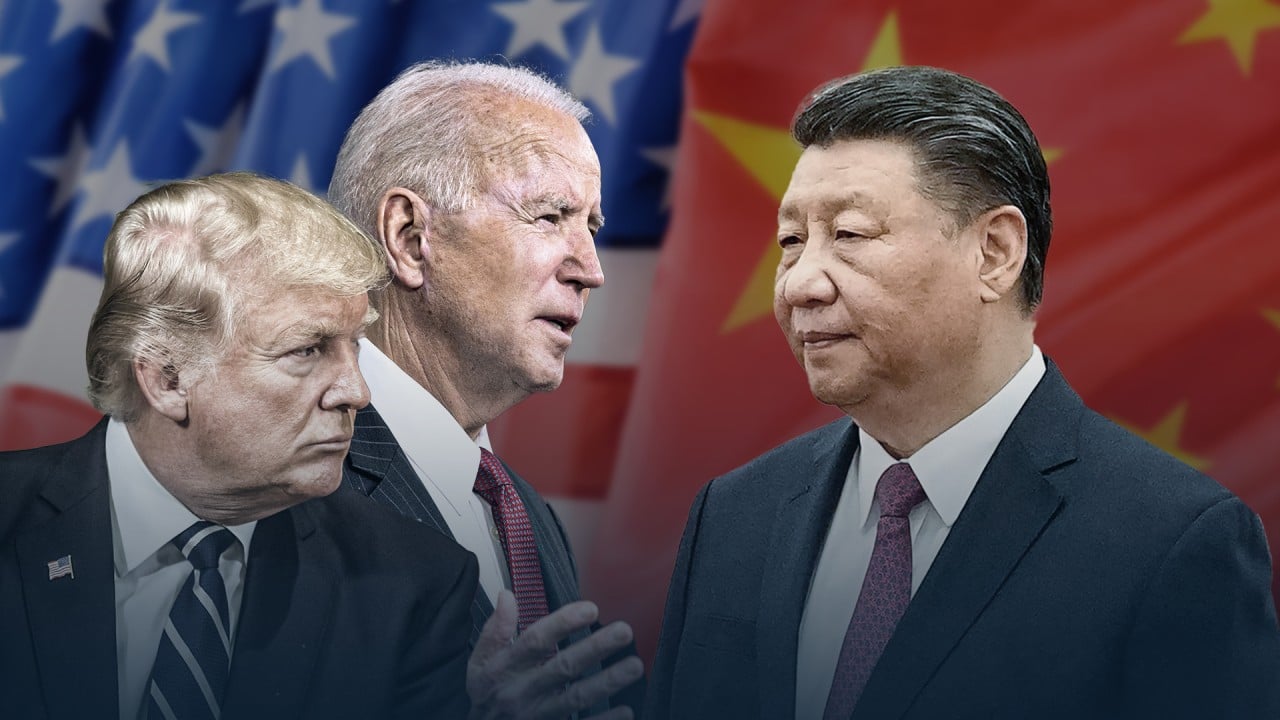
Anti-Chinese laws take a toll in Florida even as Ron DeSantis falters in his presidential run
- The Florida governor has built his campaign partly on moves against Chinese staff at state universities and restrictions on property purchases
- ‘The Chinese Communist Party is not welcome in the state of Florida,’ he said in September
A two-decades-old joint US-China hospitality programme. Researchers across all academic disciplines. Scholarship recipients at a prestigious private elementary school. Chinese purchases of homes in Florida. College students who want to talk to family members in China.
These are some of the early victims of Florida Governor Ron DeSantis’ recent anti-Chinese influence legislation in the state – moves observers believe he made to help secure his 2024 presidential bid, and moves that he touted in at least three of the Republican primary debates.
As the 2024 presidential campaign season picks up, and candidates face pressure to be tough on China, DeSantis’ targeting of Chinese influence is unlikely to win him the Republican nomination, but may ultimately upend more lives.
‘It’s simply unconscionable’
In December, Florida International University – the state’s second largest, in terms of enrolment – ended its long-standing partnership with China’s Tianjin University of Commerce.
The two schools have hosted a joint campus for hospitality and tourism studies in Tianjin since 2003, but were compelled to discontinue in light of a foreign education entities bill DeSantis signed into law in May.
Also in December, the university paused hiring of Chinese and citizens of six other “countries of concern” – Iran, Cuba, North Korea, Russia, Syria and Venezuela – also in an effort to comply with the same law.
Ron DeSantis lashes out at China and corporate power in campaign speech
“Try to imagine a successful Fortune 500 company that refuses to hire or do business with 1.73 billion people – over one-fifth of the world’s population. It’s simply unconscionable,” said Greg Webster, a psychology professor who signed the petition.
“Florida’s universities should be promoting the free exchange of people, ideas, and capital, not squandering them.”
Faculty members were also quick to point out that students from China and Iran were some of their strongest, and that their contributions outweighed any perceived security risks.

Vague language, unclear guidance
DeSantis’ new law does not explicitly ban hiring staff or researchers from those “countries of concern” but its vague language has led universities to limit hiring as they await clearer instruction.
Latest guidance from the State University System of Florida board of governors said that universities must obtain its approval before hiring a citizen of one of the countries for academic, administrative or research purposes.
The guidance does not discriminate between academic disciplines that are related to national security and those that are not.
Haley and DeSantis turn fire on Trump in Republican 2024 race
The law also prohibits state colleges and universities from accepting grants from or participating in agreements or partnerships with any college or university based in these countries – though a waiver can be obtained through the state university system’s board of governors or the state’s education department.
According to faculty, however, getting a waiver would add extra burden to exchange and research activities.
In addition, members on the two bodies considering waivers are appointed by DeSantis, and critics worry these appointees would block approvals.

Suspensions of Chinese scholarship programmes
In September, in line with provisions in the same bill, DeSantis announced the suspension of scholarship programmes to four private elementary and secondary schools part of Spring Education Group, an education network controlled by Primavera Holdings, a major private equity firm based in Hong Kong.
“The Chinese Communist Party is not welcome in the state of Florida,” said DeSantis.
“We will not put up with any attempt to influence students with a communist ideology or allow Floridians’ tax dollars to go to schools that are connected to our foreign adversaries.”
Parents were furious about the disruption, challenging the governor to demonstrate evidence of links to the Communist Party or Chinese ideology.
State Representative Anna Eskamani, a Democrat whose district is home to some of the affected schools, characterised the bill as mere political posturing and said it was only hurting DeSantis’ voter base. She added that at least one school has appealed the decision.
DeSantis says China creates conflict by propping up Russia and Iran
DeSantis: too soft on China?
But this thicket of restrictions on Chinese influence do not appear to be enough for DeSantis’ political opponents.
Nikki Haley, the former UN ambassador battling him for second place for the Republican presidential nomination – both trail former president Donald Trump by double-digit percentage points – last week accused DeSantis in a campaign video of being too soft on China.
The video lambasts DeSantis for calling China “Florida’s most important trading partner” (which the website of a now-defunct, quasi-government agency that DeSantis chaired did, as of 2021) and allowing a Chinese military contractor to expand near a US naval base (which was done by a US subsidiary of a Chinese state-owned aerospace firm in October 2022, but without government incentives).

The attacks come days ahead of the Iowa caucuses on Monday, considered the first test for Republicans in the 2024 election cycle. DeSantis and Haley are both slated to attend the caucuses.
“DeSantis’ political strategy to target China is driven, in part, by a desire to pick up some of Trump’s base who gravitated to him in 2016 because of his anti-China rhetoric and his anti-globalism sentiment,” said David Macdonald, an assistant professor of political science at the University of Florida.
Trump rivals DeSantis and Haley face off in last debate before Iowa vote
Macdonald said that DeSantis was sticking with “being an education ‘culture warrior’” as it’s what has allowed him to stand out among “ambitious Republicans”, noting how DeSantis built his national profile when advocating against mask mandates and school closures during the Covid-19 pandemic.
DeSantis has taken aim at Chinese influence in Florida’s education system since 2021, when he signed a bill requiring state universities to disclose foreign grants over US$50,000 and limiting intercultural agreements between Florida schools and schools from countries of concern.
As part of a package of bills in May, DeSantis also blocked the use of Chinese-owned apps like TikTok and WeChat on public devices and servers, and restricted Chinese individuals and entities from purchasing property in Florida.
The effect on Chinese students in Florida
The effects of the technology ban have been felt hardest by Chinese students at Florida’s public universities, thousands of whom attend schools like Florida International University and the University of Florida.
In April, two UF Chinese student associations issued a rare statement about the restrictions on WeChat and QQ, Chinese messaging apps that censor keywords that Beijing deems politically sensitive.
“For the vast majority of students living on campus, these apps are the only means of staying in touch with their loved ones who are thousands of miles away,” they wrote.
“We are proud Gators,” the statement continued, referring to the mascot of the University of Florida. “But at this moment we feel excluded and targeted as if we do not belong here.”
Neither the governor’s office nor the DeSantis campaign responded to requests for comment about the laws’ impact.
China hits out at US ‘harassment’ of Chinese students at American border
Florida’s anti-China property laws
Meanwhile, DeSantis’ property and agricultural land restrictions law, similar to other legislation being introduced in states across the country, has continued to cause headaches for investors, real estate agents and ordinary homebuyers in Florida.
The law prevents citizens from the seven countries of concern from purchasing or holding a controlling interest in property within 10 miles of any military installations, with exceptions made for those buyers holding non-tourist visas.
It is particularly restrictive for Chinese citizens, who are limited to purchasing one residential property under two acres that is not within five miles of any military installation.
As a result, developers have reportedly been forced to delay projects, causing business groups to argue that the law’s broad language may have unintended and negative consequences for Florida’s economy.
In October, China disappeared from the list of top 10 countries that searched MiamiRealtors.com, according to the Miami Association of Realtors. Earlier in the year, it was consistently in the top 10, cracking the top three in several months.
Chinese-Americans and civil rights groups say that the law has already had discriminatory effects, citing mortgage lenders who have rejected applications from eligible Chinese buyers to avoid extra paperwork and other complications.
Chinese residents in Florida sue state over property ownership ban
Bethany Li, a legal director of the Asian American Legal Defense and Education Fund who is supporting the plaintiffs, said, “I don’t think there’s any good way to implement this type of unconstitutional law.”
“One of the things that real estate agents have said to us is, what does this mean practically? Does this mean that anytime someone who looks vaguely Asian who walks into our office, we need to start asking for passports?”
What is for certain, however, is that regardless of the national political outcomes, residents are already ready to vote with their feet.
As one Chinese student told the University of Florida’s campus newspaper: “I will definitely not stay in Florida.”


